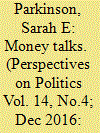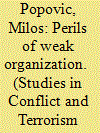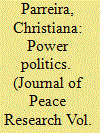|
|
|
Sort Order |
|
|
|
Items / Page
|
|
|
|
|
|
|
| Srl | Item |
| 1 |
ID:
150501


|
|
|
|
|
| Summary/Abstract |
Scholarship on militant organizations and rebel movements emphasizes the effects of fragmentation and disunity on military and political outcomes. Yet this scholarship’s focus on formal, durable, and externally observable aspects of organizational structure omits the social practices that constitute, reinforce, and reproduce intra-group schisms. How do intra-organizational divisions calcify into permanent cleavages? What processes reproduce factions over time? Using the case of Fatah in Lebanon, I argue that informal discursive practices—e.g., gossip, jokes, complaints, storytelling—contribute to the maintenance and reproduction of intra-organizational factions. Specifically, I focus on how networks of meaning-laden, money-centric discourse structure relations among militants who identify as being “Old Fatah.” I demonstrate that while these practices frequently originate in the organizational realm, cadres subsequently reproduce them within kinship, marriage, and friendship networks. This “money talk” between age cohorts within the quotidian realm connects younger members of Fatah to older cadres through collective practices and conceptions of organizational membership. These practices both exemplify an intra-organizational schism and constitute, in part, the faction called Old Fatah. Examining how symbolic practice comprises social structure thus provides important insight into the politics of organizations such as militant groups, social movements, and political parties.
|
|
|
|
|
|
|
|
|
|
|
|
|
|
|
|
| 2 |
ID:
141294


|
|
|
|
|
| Summary/Abstract |
Why do some militant groups defect against their sponsors, while others remain loyal? Pakistan's sponsorship of Jaish-e-Mohammad and Lashkar-e-Taiba offers a controlled case comparison as the former turned its guns against Islamabad, while the latter remained obedient despite a similar strength, ethnic ties to the regime, and the presence of alternative supporters. What explains Jaish's defection and Lashkar's loyalty? Drawing on organizational and principal-agent theory, I argue that militant organizations that are more decentralized and factionalized are more likely to turn on their sponsors, because their weak command and control as well as dispersed decision making limit the militant leaders' ability to follow through on their commitments to the sponsors and makes it more difficult for the sponsors to discipline the militant organization. When a sponsor attempts to coerce such organizations into submission by detaining militant leaders, freezing or confiscating their material assets the rank-and-file is likely to turn guns against the sponsor.
|
|
|
|
|
|
|
|
|
|
|
|
|
|
|
|
| 3 |
ID:
180197


|
|
|
|
|
| Summary/Abstract |
Scholars observe that armed non-state actors (NSAs) often provide social services to reinforce their popular support and legitimacy as guarantors of local order. On the other hand, NSAs usually face funding constraints that make the independent provision of distributive goods difficult. This article argues that armed NSAs employ an alternative, more cost-effective tactic to deliver services. It argues that militant groups can leverage their armed capacity to capture control of and monopolize access to state-sponsored services. As an example, it documents the capture of public electricity infrastructure that took place in post-invasion Baghdad under the Sadrist Movement, an armed group formed shortly after the ouster of the Ba’athist state. Using local-level information about the location of Sadrist offices and remote sensing data, it estimates that Sadrist-affiliated neighborhoods in Baghdad saw an average increase in access to electricity between 2003 and 2006 that was significantly greater than in other areas of the city. The article concludes by addressing threats to inference, showing that these differences are not alternatively explained by demographic differences or changes therein due to ongoing conflict. It also discusses how this NSA strategy might contribute to an equilibrium of low state legitimacy and weak capacity in fragile contexts like that of post-2003 Iraq.
|
|
|
|
|
|
|
|
|
|
|
|
|
|
|
|
| 4 |
ID:
174711


|
|
|
|
|
| Summary/Abstract |
The literature on political violence emphasizes two main ways that militant organizations ‘win’: eliminating the adversary outright or coercing the adversary into making concessions. While most do not win in this way, some organizations that fail to win go on to achieve their goals in post-conflict political competition. What explains variation in the post-conflict political success of militant organizations that did not achieve their organizational goals on the battlefield? In this study, we run the first large-n empirical analysis of the phenomenon. Our empirical results show that organizational size and wartime lethal capacity positively predict the political success of militant organizations that did not win on the battlefield. Other plausibly related features of militant organizations, such as their united wartime front or coherent ideology, do not predict eventual political success. Additionally, we investigate the case of Frente Farabundo Martí para la Liberación Nacional in El Salvador and present marginal effects analyses—further illustrating the effects of a legacy of violence and organizational size on post-conflict political success.
|
|
|
|
|
|
|
|
|
|
|
|
|
|
|
|
|
|
|
|
|